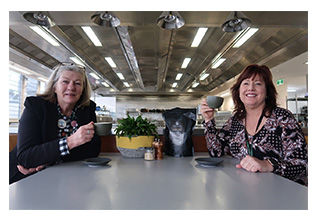Home >
News and Events >
2021 >
September >
Ending slavery one cup at a time
 6 September 2021
6 September 2021
Ensuring schools follow ethical purchasing practices to prevent exploitation and slavery can be as easy as drinking a cup of coffee.
It is estimated that over 40 million people globally are trapped in slavery or slavery-like conditions – one in four of them a child. Some are trafficked into slavery and others forced to work in appalling conditions for a pittance. Much of the coffee and tea we drink, and the cocoa used in the chocolate we eat and drink, can be traced back to these children and adults working in conditions of slavery. Schools across the Archdiocese of Melbourne have risen to the challenge to make simple changes that have a significant impact on some of the world’s most vulnerable people.
Earlier this year, students at Caroline Chisholm Catholic College, Braybrook, looked into ethical purchasing and the supply chains of everyday goods that they buy. They found the supplier of their school laptops was poorly rated by an ethical purchasing guide. A video of their story can be found in the Slavery-free section of the RESource website.
For Aquinas College, Ringwood, ethical purchasing practices have been in place at CafeN9ne (Wurundjeri Trade Trading Centre) since 2017. After providing information and some blind taste-tests of slavery-free products to their community, the school checked the numbers and found the changes would have both an ethical and financial benefit.
Melbourne Archdiocese Catholic Schools (MACS), in collaboration with Australian Catholic Religious Against Trafficking in Humans (ACRATH) and the Catholic Archdiocese of Melbourne, developed a Resource Kit to help schools begin the transition to a slavery-free environment by creating a slavery-free staffroom. The kit, along with other resources and testimonials from Catholic schools, can be found on the RESource website.